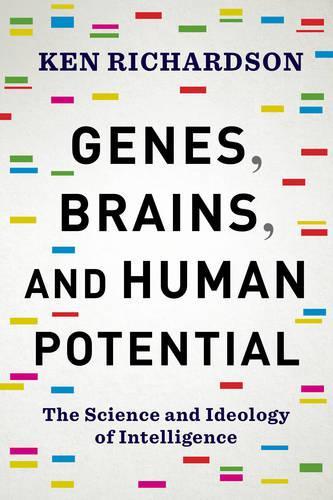Full Product Details
Author: Ken Richardson
Publisher: Columbia University Press
Imprint: Columbia University Press
Dimensions:
Width: 15.20cm
, Height: 3.30cm
, Length: 22.90cm
Weight: 0.454kg
ISBN: 9780231178426
ISBN 10: 0231178425
Pages: 408
Publication Date: 21 March 2017
Audience:
Professional and scholarly
,
General/trade
,
Professional & Vocational
,
General
Format: Hardback
Publisher's Status: Active
Availability: Manufactured on demand

We will order this item for you from a manufactured on demand supplier.
Language: English
Reviews
In his latest book, Genes, Brains and Human Potential, Richardson has again creatively illuminated the bases and limitations of genetic reductionist accounts of human intelligence, showing how cutting-edge research provides a valid alternative to such counterfactual and egregiously flawed models. Informative and inspiring, he convincingly counters these failed accounts of intelligence, forwarding a new relational theory of human development. -- Richard M. Lerner, Bergstrom Chair in Applied Developmental Science and Director, Institute for Applied Research in Youth Development Tufts University
In his latest book, Genes, Brains, and Human Potential, Richardson has again creatively illuminated the bases and limitations of genetic reductionist accounts of human intelligence, showing how cutting-edge research provides a valid alternative to such counterfactual and egregiously flawed models. Informative and inspiring, he convincingly counters these failed accounts of intelligence, forwarding a new relational theory of human development. -- Richard M. Lerner, Bergstrom Chair in Applied Developmental Science and Director, Institute for Applied Research in Youth Development Tufts University Ken Richardson's previous books played a key role in countering genetic determinist theories of human intelligence. In this important new book, Richardson shows that genetic theories of intelligence are based on bad science, and puts forward a dynamic model of human potential. In the process, he highlights recent discoveries about the nature of the gene and biological systems that support a new model of intelligence. His work has important implications for education, and for understanding human intelligence. -- Jay Joseph, Psy.D., clinical psychologist and author of The Trouble with Twin Studies. Genes, Brains, and Human Potential presents the synthesis of an extended biological systems view of intelligence that Ken Richardson has developed over decades. This bold book is a must-read for those interested in the science of intelligence and human potential. It provides a skillful and scholarly critique of traditional views of intelligence that continue to rely on outdated genetic or brain reductionism. In its place Richardson presents a comprehensive and rich analysis of how intelligent systems develop through dynamical processes occurring across multiple biological and psychological levels, from cells to societies. This book represents a significant advance in our understanding of human development and potential, a clear and comprehensive road map for anyone interested in making sense of the complexities of intelligence and its development across the life span. -- Robert Lickliter, Florida International University
In his latest book, Genes, Brains and Human Potential, Richardson has again creatively illuminated the bases and limitations of genetic reductionist accounts of human intelligence, showing how cutting-edge research provides a valid alternative to such counterfactual and egregiously flawed models. Informative and inspiring, he convincingly counters these failed accounts of intelligence, forwarding a new relational theory of human development. -- Richard M. Lerner, Bergstrom Chair in Applied Developmental Science and Director, Institute for Applied Research in Youth Development Tufts University Ken Richardson's previous books played a key role in countering genetic determinist theories of human intelligence. In this important new book, Richardson shows that genetic theories of intelligence are based on bad science, and puts forward a dynamic model of human potential. In the process, he highlights recent discoveries about the nature of the gene and biological systems that support a new model of intelligence. His work has important implications for education, and for understanding human intelligence. -- Jay Joseph, Psy.D., clinical psychologist and author of The Trouble with Twin Studies. Genes, Brains, and Human Potential presents the synthesis of an extended biological systems view of intelligence that Ken Richardson has developed over decades. This bold book is a must-read for those interested in the science of intelligence and human potential. It provides a skillful and scholarly critique of traditional views of intelligence that continue to rely on outdated genetic or brain reductionism. In its place Richardson presents a comprehensive and rich analysis of how intelligent systems develop through dynamical processes occurring across multiple biological and psychological levels, from cells to societies. This book represents a significant advance in our understanding of human development and potential, a clear and comprehensive road map for anyone interested in making sense of the complexities of intelligence and its development across the life span. -- Robert Lickliter, Florida International University
Author Information
Ken Richardson was formerly senior lecturer in human development at the Open University. He is the author of six books, including The Making of Intelligence (1999) and Models of Cognitive Development (1998).




